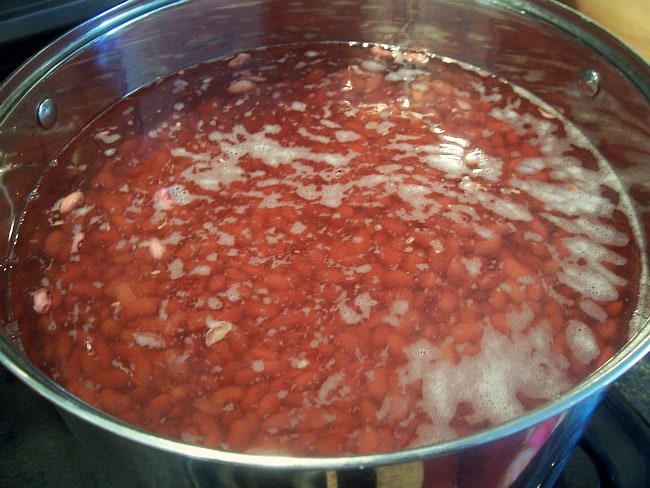Beans are a versatile and shelf-stable pantry staple. But even properly stored cooked beans don’t last forever. Knowing when your cooked beans have gone bad can prevent foodborne illness. This guide covers the shelf life of cooked beans and the signs indicating spoiled beans.
Cooked beans are highly perishable and prone to spoilage by bacteria if care isn’t taken. When stored properly, cooked beans last 3-5 days refrigerated and 6-12 months frozen. But there are visual, olfactory, and textural signs that cooked beans have gone bad.
Being able to identify spoiled beans can protect you and your family. Read on for the details on detecting bad beans and when to throw them out
How Long Do Leftover Cooked Beans Last?
First understand the shelf life of cooked beans when stored properly
- Refrigerated: 3 to 5 days
- Frozen: 6 to 12 months
These time frames assume beans were rapidly chilled after cooking and stored in airtight containers. Exposure to air and warmer temperatures sharply reduces how long beans stay safe.
Shelf life also depends on preparation. Beans cooked from dry have a slightly shorter shelf life than canned. And immersion-cooked beans last longer than slow-cooked or pressure cooked.
So check when your leftovers were prepared and how long they’ve been stored. Then watch for the following signs of spoiled beans.
Detecting When Cooked Beans Have Gone Bad
Rely on your senses to determine if cooked beans have spoiled Signs include
Sight
- Mold growth – fuzzy or slimy spots
- Unnatural colors – extreme darkening or unnatural hues
- Dryness/shriveling – bean skins appear wrinkled
Smell
- Rancid, sour, or “off” odors
- Very strong bean smell
Texture
- Softness – beans partially dissolve, mushy
- Sliminess – beans feel slippery
Taste
- Bitter, sour, or unpleasant flavors
If you notice any of these red flags, discard the beans. Don’t taste to confirm. With proper storage, cooked beans can safely last 5 days refrigerated, so toss beans exceeding that age.
What Happens When Beans Go Bad?
Several biological processes cause beans to spoil and become unsafe:
Microbial Growth
Bacteria like Bacillus cereus and Clostridium perfringes flourish on cooked beans, producing toxic byproducts.
Moisture Loss
As beans dry out, flavor and texture deteriorate. Beans become tough, distorting their shape.
Freezer Burn
Improperly wrapped frozen beans get damaged by air exposure. Beans become dehydrated and absorb odors.
Germination
If beans soaked too long before cooking, they may begin germinating. This alters their flavor.
Any of these mechanisms can lead to spoiled, unsafe beans. Remember, don’t taste beans with signs of spoilage – simply discard.
Can Spoiled Beans Make You Sick?
Yes, consuming rancid cooked beans can cause foodborne illness. Symptoms include:
- Nausea, vomiting, diarrhea
- Abdominal pain and cramping
- Fever, headache, muscle aches
- Dehydration
Severe cases may require hospitalization, especially for high-risk groups like children, pregnant women, seniors, and those with compromised immunity.
Don’t take chances with suspect beans. When in doubt, throw it out.
How to Avoid Spoiled Cooked Beans
Prevention is key to avoid sickening spoiled beans. Follow these best practices:
- Rapidly chill cooked beans within 2 hours – don’t leave at room temperature.
- Store beans in airtight containers, minimizing air exposure.
- Cook only the amount of beans you plan to consume within 3-5 days.
- Freeze excess beans in single-use portions for lasting quality.
- Label all cooked bean containers with prep date and use within recommended time.
- Check beans for any signs of spoilage before reheating or eating.
Adhering to safe food handling and storage techniques will keep your beans fresher longer.
What to Do With Beans Past Their Prime
If your cooked beans have overstayed their welcome in the fridge or freezer but aren’t fully spoiled, there are uses that can salvage them:
- Puree into dips, spreads, sauces. Blending can mask some textural changes.
- Mash into bean patties or balls along with other ingredients.
- Incorporate into soups, stews, and chilies where beans break down further.
But refrain from eating beans that show obvious toxic contamination. Play it safe and keep harmful bacteria out of your food.
The Takeaway on Spotting Spoiled Beans
Don’t mess around with bad beans. Look for visual cues like mold,unexpected colors, and shriveling. Give cooked beans a sniff test, watching for foul odors. Check texture, avoiding beans that are overly soft, mushy or slimy.
If beans have been lingering too long after cooking, or show any signs of spoilage, get rid of them asap. Stick to food safety best practices when handling cooked beans.
With vigilance and proper storage, you can catch spoiled beans before they make you sick. Trust your senses, know the risks, and stay healthy.

Beans in American Comfort Food
Beans are a cornerstone in American comfort food, delivering both flavor and substance. Key dishes include:
- To make red beans and rice, you slow-cook red kidney beans with vegetables, spices, and sometimes smoked meat. Then you serve them with rice.
- Beans can be used to add depth and nuttiness to many casserole recipes, or they can be used as a topping on nachos for a rich, comfort food experience.
- Options for vegetarians: Beans can be used instead of meat in comfort foods like veggie burgers to add texture and protein.
In American cooking, beans provide comforting warmth and are often combined with cheese, quinoa, and different sauces to make rich dishes.
Understanding Cooked Beans Shelf Life

Cooked beans offer nutritious benefits but have a limited shelf life that depends on storage conditions. Recognizing the shelf life and signs of spoilage can ensure safety and quality.
The Secret to Cooking Beans The Right Way So You’re Not Farting All Day!
FAQ
Can you eat cooked beans after 7 days?
When should you throw out cooked beans?
How long does it take for beans to go bad?
Do cooked pinto beans go bad?
